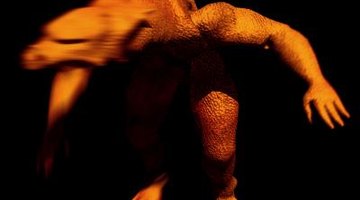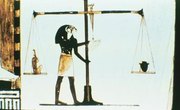Alfred Whitehead was a metaphysical theorist who subscribed to the idea of process philosophy, the attribution of movement and creativity to reality -- if it exists, it creates and develops. His fascinating philosophy is at odds with that of Ork, a fictional character from John Gardner's "Grendel," whose outlook, much more traditional, is also much more limiting.
Whitehead and Half-Truth
Whitehead relied on his mathematical and logical background to give substance to his philosophy of process, the concept that reality, never fully knowable, is realized by what one can develop. In his seminal work, "Process and Reality," he notes that "attributes of physical bodies are really the forms of internal relationships between actual occasions." The whole of reality is therefore a shifting ground of change and activity, with nothing fully realizable by human thought: "all truths are half-truths," says Whitehead, in his stance that nothing is fully known, since we are always discovering more.
Ork Meets Half-Truth
Ork, a blind Scydling priest in "Grendel," is also a seeker after whole truths, who meets a half-truth and mistakes it for absolute reality. Ork encounters Grendel, the monster Beowulf will slay, who identifies himself as "The Destroyer," chief God of the Danes. Prostrate with religious fear, Ork believes he has found "the ultimate limitation ... and the ultimate irrationality." With great fervor, Ork describes the Destroyer as the "ground for concrete actuality" and "desire establishing purposes." In other words, the Destroyer to Ork is reality's limit and complete realization.
Ork vs. Whitehead
Whitehead would have found much about which to contend with Ork, had they met; among other things, Ork's literally blind faith in the monotheistic belief system is horribly limiting. Whitehead believed that "religion is the last refuge of human savagery," an idea that discredits not only Ork's half-savage Danish world but any philosophy that attempts to put God into a box or one's back pocket. God, the Destroyer, is the one entity Whitehead postulates as being both temporal and non-temporal, therefore He -- if He indeed is -- is an unknowable half-truth.
Blindness and Irony
The novel, written 25 years after Whitehead's death, doubles the unfortunate Ork's blindness: he speaks not to God but to Grendel, a lowly monster full of existential doubt who will soon start eating Ork's countrymen. It's an irony Whitehead would have appreciated, since he believed assigning knowable and absolute truth to unknowable half-truths "plays to the devil."
Related Articles
References
- Stanford Encyclopedia of Philosophy: Process Philosophy
- Process and Reality; Alfred North Whitehead
- Grendel; John Gardner
- hubs.com: Religion in the Making by Alfred North Whitehead
Resources
Writer Bio
Michael Stratford is a National Board-certified and Single Subject Credentialed teacher with a Master of Science in educational rehabilitation (University of Montana, 1995). He has taught English at the 6-12 level for more than 20 years. He has written extensively in literary criticism, student writing syllabi and numerous classroom educational paradigms.











